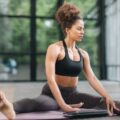The Power of Breath
Breathing is an essential function for life, but it can also be a powerful tool for controlling anxiety. Certain breathing techniques have been shown to activate the body’s natural relaxation response, lowering blood pressure and heart rate and reducing feelings of stress.
Diaphragmatic Breathing
One such technique is diaphragmatic breathing, also known as belly breathing. To practice:
- Sit or lie flat in a comfortable position.
- Place one hand on your chest and the other on your stomach.
- Inhale slowly through your nose, feeling your stomach press into your hand.
- Tighten your stomach muscles and exhale through pursed lips.
Aim for 5-10 deep, slow breaths per minute. The key is breathing from your diaphragm rather than your chest.
4-7-8 Breathing
Another highly effective technique is 4-7-8 breathing:
- Exhale completely through your mouth.
- Close your mouth and inhale quietly through your nose for a mental count of 4.
- Hold your breath for a count of 7.
- Exhale completely through your mouth for a count of 8.
Repeat for several minutes. The extended exhale activates the parasympathetic nervous system, inducing relaxation.
Mindful Breathing
You can also combine focused breathing with mindfulness meditation. Sit comfortably and turn your attention to your breathing. Pay attention to the rise and fall of your chest or belly with each inhale and exhale. When your mind wanders, gently return focus to your breath.
Start with 5-10 minutes per day, increasing over time. The combination of controlled breathing and present moment awareness provides anxiety relief.
Breathing Away Stress
Practice these breathing exercises daily, especially when feeling anxious or overwhelmed. Over time, they can lead to lasting changes by retraining your nervous system to remain calm in stressful situations.
While not a cure-all, breathwork is a free, accessible tool that can make a real difference in controlling anxiety.
FAQ
What is the best breathing exercise for anxiety?
Diaphragmatic breathing, 4-7-8 breathing, and mindful breathing during meditation are highly effective breathing techniques for controlling anxiety.
How long does it take for breathing exercises to work?
You may notice initial benefits after the first session. But learning proper breathing techniques takes practice – it’s best to commit to daily sessions for at least 2-3 weeks to see more lasting effects.
When should I do breathing exercises for anxiety?
Aim for daily practice, even when you feel calm. This will train your body’s relaxation response. It’s also helpful to use breathing techniques in the moment when you notice anxiety building.
Are breathing exercises as effective as medication for anxiety?
For some people with mild to moderate anxiety, consistent breathing practice can be as effective as anti-anxiety medication. For more severe anxiety, medication and therapy may still be needed along with breathwork and lifestyle changes.
Can over breathing cause anxiety?
Yes, hyperventilation caused by too-rapid, shallow breathing can trigger anxiety symptoms. Learning proper diaphragmatic breathing helps restore balance in the body’s oxygen and carbon dioxide levels, alleviating these symptoms.









